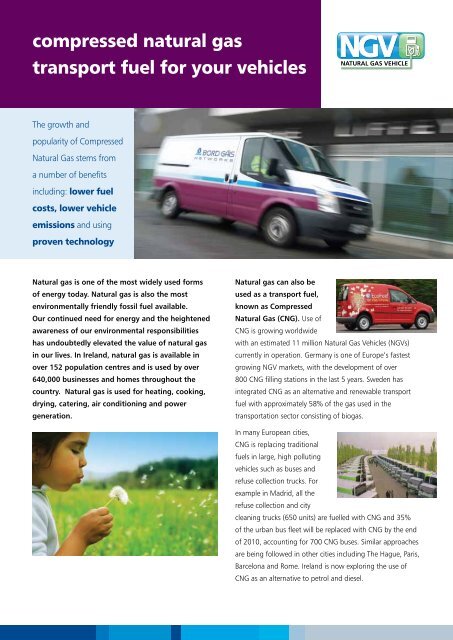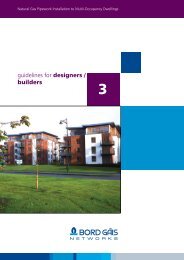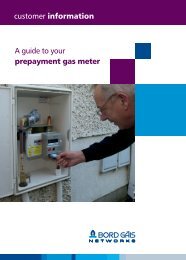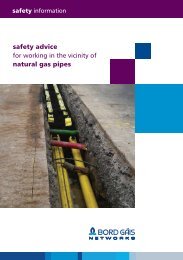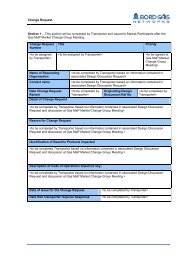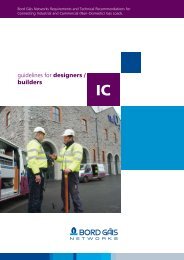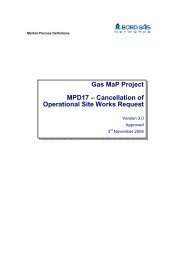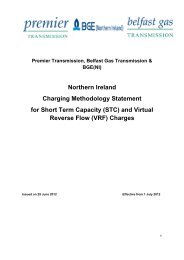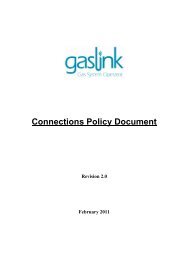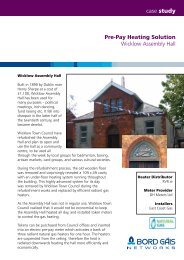Natural Gas as a transport fuel brochure (PDF, 379Kb) - Bord Gais ...
Natural Gas as a transport fuel brochure (PDF, 379Kb) - Bord Gais ...
Natural Gas as a transport fuel brochure (PDF, 379Kb) - Bord Gais ...
- No tags were found...
Create successful ePaper yourself
Turn your PDF publications into a flip-book with our unique Google optimized e-Paper software.
compressed natural g<strong>as</strong><strong>transport</strong> <strong>fuel</strong> for your vehiclesThe growth andpopularity of Compressed<strong>Natural</strong> <strong>G<strong>as</strong></strong> stems froma number of benefitsincluding: lower <strong>fuel</strong>costs, lower vehicleemissions and usingproven technology<strong>Natural</strong> g<strong>as</strong> is one of the most widely used formsof energy today. <strong>Natural</strong> g<strong>as</strong> is also the mostenvironmentally friendly fossil <strong>fuel</strong> available.Our continued need for energy and the heightenedawareness of our environmental responsibilitiesh<strong>as</strong> undoubtedly elevated the value of natural g<strong>as</strong>in our lives. In Ireland, natural g<strong>as</strong> is available inover 152 population centres and is used by over640,000 businesses and homes throughout thecountry. <strong>Natural</strong> g<strong>as</strong> is used for heating, cooking,drying, catering, air conditioning and powergeneration.<strong>Natural</strong> g<strong>as</strong> can also beused <strong>as</strong> a <strong>transport</strong> <strong>fuel</strong>,known <strong>as</strong> Compressed<strong>Natural</strong> <strong>G<strong>as</strong></strong> (CNG). Use ofCNG is growing worldwidewith an estimated 11 million <strong>Natural</strong> <strong>G<strong>as</strong></strong> Vehicles (NGVs)currently in operation. Germany is one of Europe’s f<strong>as</strong>testgrowing NGV markets, with the development of over800 CNG filling stations in the l<strong>as</strong>t 5 years. Sweden h<strong>as</strong>integrated CNG <strong>as</strong> an alternative and renewable <strong>transport</strong><strong>fuel</strong> with approximately 58% of the g<strong>as</strong> used in the<strong>transport</strong>ation sector consisting of biog<strong>as</strong>.In many European cities,CNG is replacing traditional<strong>fuel</strong>s in large, high pollutingvehicles such <strong>as</strong> buses andrefuse collection trucks. Forexample in Madrid, all therefuse collection and citycleaning trucks (650 units) are <strong>fuel</strong>led with CNG and 35%of the urban bus fleet will be replaced with CNG by the endof 2010, accounting for 700 CNG buses. Similar approachesare being followed in other cities including The Hague, Paris,Barcelona and Rome. Ireland is now exploring the use ofCNG <strong>as</strong> an alternative to petrol and diesel.
compressed natural g<strong>as</strong> – <strong>transport</strong> <strong>fuel</strong> for your vehiclesWhy should Ireland promote the use of natural g<strong>as</strong> <strong>as</strong> a <strong>transport</strong> <strong>fuel</strong>?l Significantly lower <strong>fuel</strong> costsIn NGV markets the cost of using natural g<strong>as</strong> in vehicles isapproximately 35% lower than using diesel and up to 60%lower than using petrol.l Lower vehicle emissions<strong>Natural</strong> g<strong>as</strong> is a low-emission <strong>fuel</strong> that does not containsulphur or heavy metals. The use of NGVs can significantlyreduce exhaust and Greenhouse <strong>G<strong>as</strong></strong> (GHG) emissions. Bychoosing cleaner <strong>transport</strong> <strong>fuel</strong>, air quality and purity levels canimprove, resulting in health and environmental benefits for all.Actual emissions vary from vehicle to vehicle and aredependent on engine design, vehicle type, geography andeven the driver’s driving method. A number of internationalstudies demonstrate that up to 20% less Carbon Dioxide(CO 2) is produced by replacing traditional <strong>transport</strong> <strong>fuel</strong>s withCNG. When comparing a CNG bus with a diesel bus, therew<strong>as</strong> a 12% reduction in CO 2levels.Further air quality improvements and health benefits include:lReductions in Nitrogen Oxide (NOx) of 20% (petrol) andup to 70% (diesel)l Reductions in Carbon Monoxide (CO) emissions of 75%(petrol) and 50% (diesel)lllReductions in hydrocarbon emissions of 50% (petrol)to 80% (diesel)Almost 99% less soot and particulate matter than dieselFewer toxic and carcinogenic pollutants.l Noise reductionNGVs are quieter than other vehicle types. Studies show thatthere can be up to 7dB reduction in noise levels when using avehicle running on CNG.l Proven technologyCNG h<strong>as</strong> been used <strong>as</strong> a <strong>transport</strong> <strong>fuel</strong> since the 1800s.NGVs are a proven technology. Recent statistics from NGVAEurope (January 2010) show that there are approximately11 million NGVs worldwide.Vehicle manufacturers offer a variety of both dedicatedCNG and bi-<strong>fuel</strong> (petrol & CNG) vehicles - including vans,trucks and buses.SafetyStrict safety standards make CNG <strong>fuel</strong>led vehicles <strong>as</strong> safe <strong>as</strong>petrol or diesel vehicles. In addition, NGV cylinders, whichstore CNG, are also subject to safety standards and rigoroustesting. <strong>Natural</strong> g<strong>as</strong> is lighter than air and, in the unlikelyevent of a leak or accidental rele<strong>as</strong>e, it will disperse rapidlyand not pool <strong>as</strong> a liquid on the ground. CNG is also nontoxic;therefore it will not pose any threat to land or water.Contact InformationFor further information contact:Patrick Callanan<strong>Bord</strong> Gáis NetworksPhone: 021 453 4000Email:pcallanan@bge.ie100%50%


